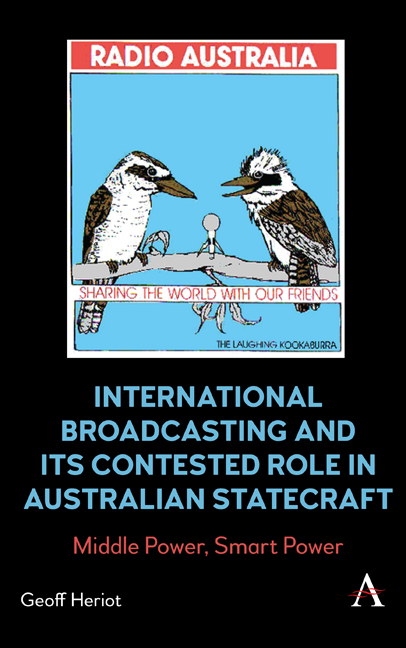 International Broadcasting and Its Contested Role in Australian Statecraft
International Broadcasting and Its Contested Role in Australian Statecraft Book contents
- Frontmatter
- Dedication
- Contents
- List of Figures
- Foreword
- Acknowledgements
- Chapter One Introduction
- Chapter Two Media and the Contest of Ideas
- Chapter Three International Broadcasting and Its Discursive Properties
- Chapter Four Mobilising ‘Softer’ Power in a Hard World
- Chapter Five Australia’s ABC: State Interests, National Evolution
- Chapter Six Purpose, Performance and Evaluation
- Chapter Seven Modernising the ABC
- Chapter Eight Policy, Priorities and Qualified Independence
- Chapter Nine Engaging with Intercultural Audiences
- Chapter Ten Indonesia, the Crucible
- Chapter Eleven Strategic Contingency and War
- Chapter Twelve Looking to the New Disorder
- Index
Chapter Eleven - Strategic Contingency and War
Published online by Cambridge University Press: 15 November 2023
- Frontmatter
- Dedication
- Contents
- List of Figures
- Foreword
- Acknowledgements
- Chapter One Introduction
- Chapter Two Media and the Contest of Ideas
- Chapter Three International Broadcasting and Its Discursive Properties
- Chapter Four Mobilising ‘Softer’ Power in a Hard World
- Chapter Five Australia’s ABC: State Interests, National Evolution
- Chapter Six Purpose, Performance and Evaluation
- Chapter Seven Modernising the ABC
- Chapter Eight Policy, Priorities and Qualified Independence
- Chapter Nine Engaging with Intercultural Audiences
- Chapter Ten Indonesia, the Crucible
- Chapter Eleven Strategic Contingency and War
- Chapter Twelve Looking to the New Disorder
- Index
Summary
In play throughout the 1970s and 1980s was the tension in Radio Australia’s dual role in the service of state interests and as an editorially independent democratic exemplar. Through its identity, editorial outlook and production norms as a regional broadcaster, it sought to demonstrate Australia as a state and a society of diversity and openness in its dealings with nations of Asia and the Pacific. Unlike political advocacy, narrowly conceived soft power ‘promotion’ or other forms of persuasive communication, this modelling of espoused norms and principles acknowledged the maxim that a state principally would be judged by how it behaved, not what it said about itself. In this chapter, I present a second study of Radio Australia operating under stress, this time in conditions of armed conflict. It reinforces the importance of agreed policy purpose and functions between government and the broadcaster; it also illustrates how the task of mitigating the tensions between interests and values can be a wicked problem.
Another political function of Radio Australia, as I proposed in Chapter 6, called for a capacity to respond to contingent events. Some events required responses that did not cause extraordinary disruption to normal operations, such as tailoring emergency information to countries afflicted by natural disasters. One major crisis discussed here necessitated an extraordinary response. During the lead-up to and conduct of the First Gulf War in 1990–1991, Radio Australia attracted both ministerial commendations and opprobrium as well as the bipartisan censure of the Senate. For its part, the parent ABC faced the unprecedented threat of ministerial intervention, which would have overridden the corporation’s otherwise independent authority by ordering it to broadcast certain matter ‘in the national interest’ (as per ABC Act 1983, s78 (3A, 5)).
The Gulf War was the first time since Vietnam in 1973 that Australian forces were deployed for possible combat. It would involve independent-minded media in a clash of espoused editorial principles and the government’s invocation of patriotism as a ‘mechanism for disciplining mass media’ (Carruthers 2000, p. 7). In the words of George Orwell (1945), this resort to the call of patriotism tended to be ‘defensive, both militarily and culturally’.
- Type
- Chapter
- Information
- International Broadcasting and Its Contested Role in Australian StatecraftMiddle Power, Smart Power, pp. 223 - 244Publisher: Anthem PressPrint publication year: 2023
